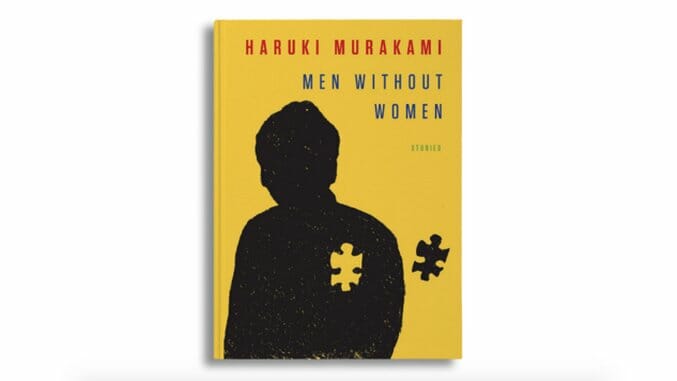No Pity: Masculinity and Haruki Murakami’s Men Without Women

Haruki Murakami’s new short story collection, Men Without Women, is not quite so cloyingly misogynistic as its name may suggest. It’s centered on women who are defined via men’s perceptions, but it resists the urge to blame said woman for the pain it presents. Murakami’s book is best considered with the understanding that male loneliness is of a particular kind—often reinforced by the very strictures by which men consider themselves, well, men.
Any discussion of male loneliness must begin with two caveats. The first is that our loneliness cannot be the fault of women; this is no fedora-wearing, MRA message board polemic. The second is that the issues which may exacerbate loneliness are our own fault, stemming from concepts of masculinity that have given us a pretty good shake for millennia.
Modern American Masculinity is the one I know best, and it feels defined by stoicism, by beards and guns and backwards Flexfit baseball caps. Such atavistic ideas can be deeply alluring; I know, because I have felt them, too. So when a man who defines himself by his Modern American Masculinity is presented with something corrosive like loneliness, he can either sacrifice a part of that masculinity and express his emotional pain or internalize it and immolate with rage. One guess as to what choice many men make.
No man is an island, as the cliché goes, yet men are encouraged to become self-sufficient ecosystems. Male friendships are often still depicted as superficial, more about creating spaces where boys can be boys—where “locker room talk” and cheap beer (or expensive whiskey) can flow—than about forging connections with others.
Somewhere along the way, men picked up a misconception about that most sought-after of male traits: confidence. The desirable expression of security in one’s self is now too often conflated with arrogance, which pushes people away rather than draws them in. Conversely, men with too little confidence already—who have had it hollowed out of them by the pressure to fit a mold of masculinity—harbor resentment at their perceived mistreatment as “nice guys.”
These men use friendship as a Trojan horse, a way to ingratiate themselves with a woman who they believe will reward them with sex for simply not being an “asshole,” rather than making their intentions clear and facing the possibility of rejection (or, you know, gaining an actual friend). These men are often among the loneliest of all, trapped in a prison created of their own fear and hatred. They picture themselves as tortured by the objects—make no doubt, that’s how they perceive women—of their affections, isolated in an empty corner they ran to on their own accord, while they spin helplessly in the fictional “friend zone.”
Ultimately, I believe masculine isolation stems from the collected spurring of pathos. Pathos and pity spur wants and then “needs,” and there is no greater sin in America—and no greater sin again amongst men—than to need. Pathos is too often trucked now with anger and embarrassment and hatred to the point where it is unrecognizable. It seems counterintuitive to say—when so much has been focused on us for so long—but if we wish to come in from the cold, we must look inside ourselves and find our pitiful core, if we ever wish to get some semblance of it back.
Or else we deserve to be, like Murakami’s characters, men without women—without others and without that pathetic, requisite part of ourselves.
B. David Zarley is a freelance journalist, essayis, and book/art critic based in Chicago. A former book critic for The Myrtle Beach Sun News, his work can be seen in Hazlitt, Sports Illustrated, The Chicago Reader, VICE Sports, The Creators Project, Sports on Earth and New American Paintings, among numerous other publications. You can find him on Twitter or at his website.







































